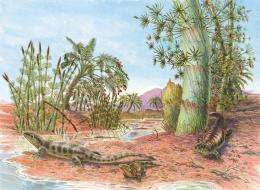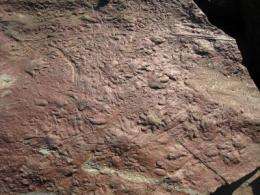Ancient reptiles conquer continental interiors. Credit: © James Robins
A new discovery of fossilized footprints reveals when reptiles first conquered dry land.
The 318-million-year-old reptile footprints were found in sea-cliffs on the Bay of Fundy, New Brunswick, Canada. They show that reptiles were the first vertebrates (animals with a backbone) to conquer dry continental interiors. These pioneers paved the way for the diverse ecosystems that exist on land today.
The footprints were discovered by Dr Howard Falcon-Lang of Royal Holloway, University of London. The results of his study, undertaken with Professor Mike Benton of the University of Bristol and Canadian colleagues, are published today in the journal Palaeogeography, Palaeoclimatology, Palaeoecology.
It has long been suspected that reptiles were the first to make the continental interiors their home. This is because reptiles do not need to return to water to breed unlike their amphibian cousins. The new discovery of footprints proves this theory. The rocks in which they occur show that the reptiles lived on dry river plains hundreds of miles from the sea.
Professor Benton said: "The footprints date from the Carboniferous Period when a single supercontinent (Pangaea) dominated the world. At first life was restricted to coastal swamps where lush rainforest existed, full of giant ferns and dragonflies. However, when reptiles came on the scene they pushed back the frontiers, conquering the dry continental interiors."
These are tetrapod trackways discovered in Nova Scotia by Dr. Howard Falcon-Lang, Royal Holloway, University of London. The trackways are the subject of research by Dr. Falcon-Lang and colleagues at the University of Bristol, UK, published this week in Palaeo-3. Credit: courtesy of Dr Howard Falcon-Lang
The same team reported the oldest known reptile footprints from a different site in New Brunswick in 2007. The new discovery is of similar age, and may be even older.
Dr Falcon-Lang added: "The Bay of Fundy is such an amazing place to hunt for fossils. The sea-cliffs are rapidly eroding and each rock-fall reveals exciting new fossils. You just never know what will turn up next."
Provided by University of Bristol

























